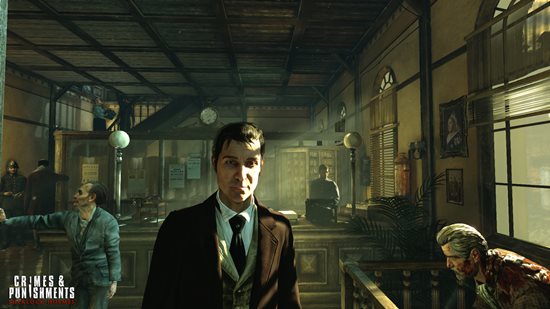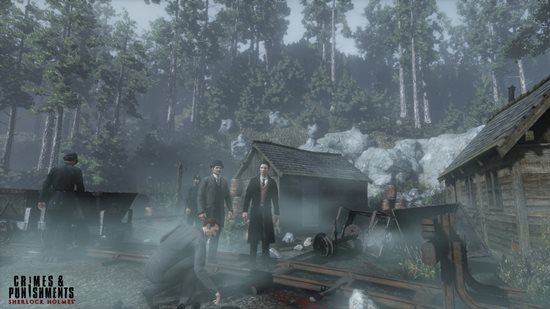Also On: Xbox One, Xbox 360, PS3, PC
Publisher: Focus Home Interactive
Developer: Frogwares
Medium: Digital/Disc
Players: 1
Online: No
ESRB: M
You don’t have to look very hard to see what Frogwares were trying to do with Sherlock Holmes: Crimes and Punishments. Between opening credits and a feature called “Sherlock vision” that draw heavily from the show’s current BBC run, and a slightly insane titular character that is, at the very least, inspired by Robert Downey Jr.’s cinematic take on Sherlock, it seems pretty apparent that the developer wanted a game that existed, roughly, in the same space as the modern TV and movie versions of the character.
The problem with that approach should be obvious just from reading it. Even making allowances for the source material’s greatness, the big- and small-screen versions of Sherlock Holmes benefit enormously from being portrayed by gifted, charismatic actors. It doesn’t matter how advanced next-gen systems are, they’re not able to create characters who can compete with Downey Jr. or Benedict Cumberbatch. Unsurprisingly, the comparison doesn’t serve the game very well.
 It doesn’t help, either, that the extra layer of gloss doesn’t mesh very well with the Crimes and Punishments’ sensibilities. After all, we’re talking about a game that a) is set in Victorian England, and b) hasn’t really changed its look in about a decade, if YouTube is anything to go by. To suddenly throw quick cuts and the aforementioned Sherlock vision on top of that is definitely a mismatch in style.
It doesn’t help, either, that the extra layer of gloss doesn’t mesh very well with the Crimes and Punishments’ sensibilities. After all, we’re talking about a game that a) is set in Victorian England, and b) hasn’t really changed its look in about a decade, if YouTube is anything to go by. To suddenly throw quick cuts and the aforementioned Sherlock vision on top of that is definitely a mismatch in style.
Not that the existing style was — or, indeed, is — anything to write home about. Sherlock Holmes: Crimes and Punishments isn’t exactly ugly, and I don’t want to say that the graphics are terrible or anything…but at the same time, this is a game that is stuck very firmly in the middle of the uncanny valley. It’s as if the designers decided that Creepy Watson wasn’t enough, and they had to go all out in making everyone in the game have horrible undead eyes. This is a problem since, as this a game that’s all about detection, you spend a significant chunk of time interacting with people and staring into their eerie, lifeless faces.
 My problems with the game run far deeper than just superficial issues, too. For example, there’s the weird mishmash of gameplay going on. On one hand, there’s stuff like the aforementioned Sherlock vision, which is the most obvious example of BBC Sherlock’s influence on the game, as you basically freeze time and make deductions about characters, as represented by floating words suddenly appearing on the screen. At the same time, though, almost everything else about Crimes and Punishments is slow-moving; you walk at a glacial pace around crime scenes and other places of interest, gather clues and (in theory, at least) forming deductions about whodunnit. It’s a little odd to go from one to the other, since they seem like they come from two completely different games.
My problems with the game run far deeper than just superficial issues, too. For example, there’s the weird mishmash of gameplay going on. On one hand, there’s stuff like the aforementioned Sherlock vision, which is the most obvious example of BBC Sherlock’s influence on the game, as you basically freeze time and make deductions about characters, as represented by floating words suddenly appearing on the screen. At the same time, though, almost everything else about Crimes and Punishments is slow-moving; you walk at a glacial pace around crime scenes and other places of interest, gather clues and (in theory, at least) forming deductions about whodunnit. It’s a little odd to go from one to the other, since they seem like they come from two completely different games.
Oh, and I say “in theory” about the deductions because that’s another of the game’s issues. I mean, I don’t know about you, but when I think “Sherlock Holmes”, I think of Holmes and Watson slowly, methodically solving crimes through reason. The answers may not be obvious, but at the same time, when Holmes reveals that someone is the who in whodunnit, you know he’s caught the right person. Crimes and Punishments takes a more…idiosyncratic approach. You still investigate and you still make deducations, but the game allows you to deduce things and draw conclusions that are completely wrong. Not only that, you get to decide whether to punish the wrongdoers (who may or may not have actually done anything wrong), or let them go free. I get that the game wants to give players more agency and to not have each case have only one solution, but at the same time, this is Sherlock Holmes. Giving each case one solution is kind of the point, I’d have thought.
 Given all my complaints, by this point you probably think I don’t like the game. That would — to take a page from the previous paragraph — be the logical deduction, after all. Yet, surprisingly, I don’t not like it…which is to say, I’m actually a fan of it. Crimes and Punishments may have an abundance of things wrong with it, but at its core, you’ve still got a pretty solid game. Yes, the gameplay doesn’t quite fit together, and yes, the characters look like crimes against nature, and yes, the deduction system is a little flawed. But Sherlock has always been about solving mysteries, and the ones he’s got here are exactly the sort of thing you want to read (er, play) from beginning to end. It may take some time to explore every possible avenue and ensure you’ve found the right solution, but so what? Solving mysteries should be about having patience and taking Holmes’ precept of “when you have eliminated the impossible, whatever remains, however improbable, must be the truth” to heart. This is a game that really wants you to explore and eliminate all those impossible solutions — and sometimes even possible ones — before finally, at long last, you come to the correct answer.
Given all my complaints, by this point you probably think I don’t like the game. That would — to take a page from the previous paragraph — be the logical deduction, after all. Yet, surprisingly, I don’t not like it…which is to say, I’m actually a fan of it. Crimes and Punishments may have an abundance of things wrong with it, but at its core, you’ve still got a pretty solid game. Yes, the gameplay doesn’t quite fit together, and yes, the characters look like crimes against nature, and yes, the deduction system is a little flawed. But Sherlock has always been about solving mysteries, and the ones he’s got here are exactly the sort of thing you want to read (er, play) from beginning to end. It may take some time to explore every possible avenue and ensure you’ve found the right solution, but so what? Solving mysteries should be about having patience and taking Holmes’ precept of “when you have eliminated the impossible, whatever remains, however improbable, must be the truth” to heart. This is a game that really wants you to explore and eliminate all those impossible solutions — and sometimes even possible ones — before finally, at long last, you come to the correct answer.
I can see where that might bother some people. In essence, the game is asking you to determine its worth based entirely on how compelling you find the stories; seeing as there are undoubtedly people out there who don’t like the original Sherlock stories — philistines, I say! — which were written by as talented a writer as Sir Arthur Conan Doyle, I have no doubt that the tales of Crimes and Punishments will have even more naysayers. Nonetheless, for those who do like a good mystery, you probably owe it to yourselves to at least give this a look, and see how much it catches your mystery-craving fancy.

